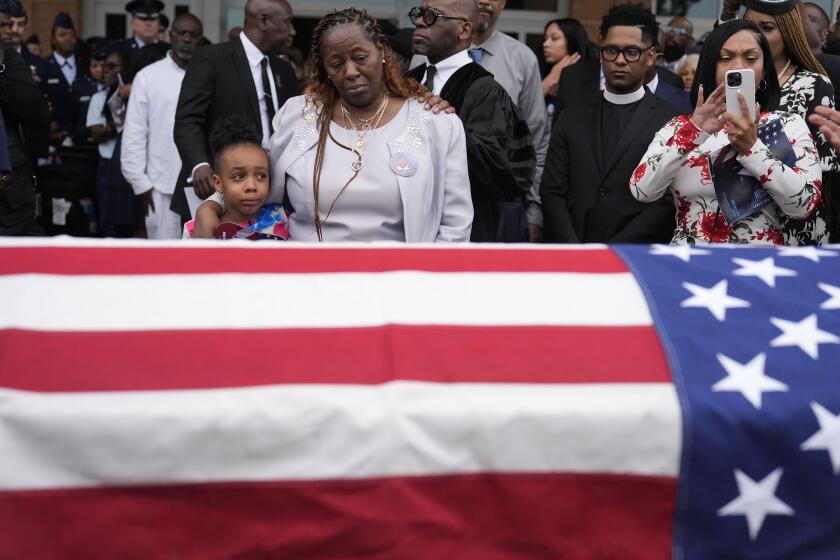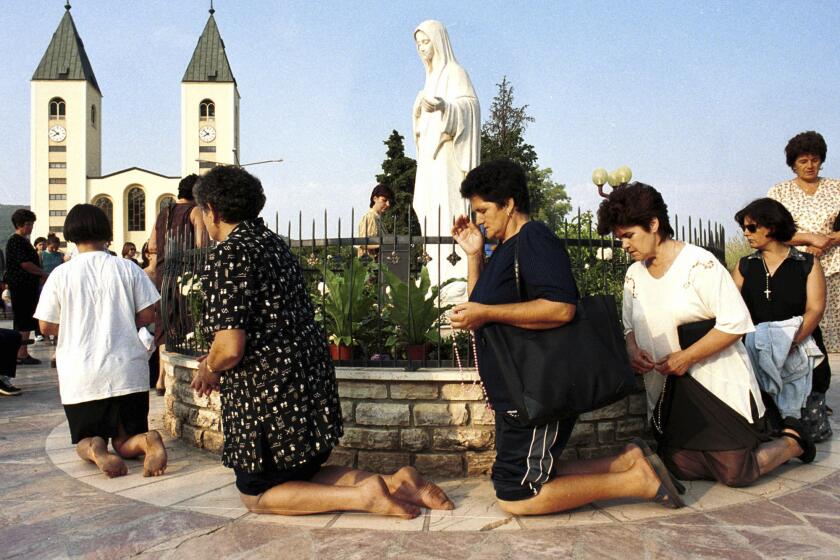War Crimes Trial Brings Hope for Justice
For almost five years, Europeans have been haunted by horrific tales of victims caught up in the brutality of war in the Balkans. On Tuesday, they finally will get a glimpse of the other side: a man formally accused of such brutality, answering in court to war crimes charges.
The occasion will be the long-awaited opening of the first trial conducted by the International Criminal Tribunal for the Former Yugoslavia, the panel established here by the U.N. 2 1/2 years ago to investigate and prosecute Balkan war crimes.
The accused, Dusan Tadic, 41, a Bosnian Serb, is not a big catch. He was no grand planner, never had much authority and was virtually unknown outside his home village of Kozarac in northwestern Bosnia and the detention camps nearby where he allegedly terrorized people. Still, it is the accumulation of individual acts of raw brutality, such as those attributed to Tadic, that constituted the real horror of the war in Bosnia-Herzegovina.
Those who knew Tadic describe him as a petty troublemaker, the lazy son of a prominent local functionary in Communist Yugoslavia, whose life seemed to flounder until the Bosnian war came his way. According to the nine-page indictment signed by Richard Goldstone, the tribunal’s chief prosecutor, Tadic belonged to a special group of uniformed Bosnian Serbs that operated in the notorious Omarska detention camp and other sites during the second half of 1992.
“During this time, Serb forces, including [Dusan] Tadic, subjected Muslims and Croats inside and outside the camps to a campaign of terror which included killings, torture, sexual assaults and other physical and psychological abuse,” the indictment asserts.
In one incident, watched by several of 36 women detainees at Omarska, eight or nine Muslim intellectuals and medical doctors were marched to an area behind a red brick building, where they were killed and their bodies mutilated. Tadic was said by the women to have been among the soldiers who carried out the murders and mutilation, specifically the carving of four Cyrillic letters in the chest of one of the victims that represented the Serbian nationalist slogan, “Only Unity Will Save the Serbs.”
Hasiba Harambasic, a doctor who was one of the witnesses, said she became ill that night and was attended by a fellow Muslim doctor. “We felt so miserable, we both cried,” Harambasic said. “Considering we were both doctors, she told me, ‘Today they took away all the male doctors, tomorrow is our turn.’ ”
The trial is expected to last at least four weeks and could go on for as long as six or seven months, tribunal officials said.
For those involved in the tribunal’s work, the proceedings involve more than putting a human face to the evils carried out in the name of ethnic superiority. For them, the trial constitutes nothing less than the beginning of a new era, one in which those responsible for committing wartime atrocities will know that they must one day answer to justice. The tribunal’s prosecutors, many of them young Americans, believe that their work will make the world safer.
They also see their tribunal as an improvement on the International Military Tribunal, which judged leading Nazis at Nuremberg after World War II. The Hague is not a court where victors judge the vanquished, they say, but a body independent of the conflict.
Despite the boost gained by the start of its first trial, the tribunal here faces serious problems. The Bosnian, Serbian and Croatian governments, although obligated under last year’s Dayton, Ohio, peace accord to deliver those accused of war crimes to The Hague for trial, have so far not done so.
*
Of 57 individuals indicted, only three are in custody: Tadic, arrested by German police in February 1994; Bosnian Croat Gen. Tihofil Blaskic, who gave himself up in late March; and Zdravko Mucic, the Muslim commander of a Bosnian Serb detention camp who was turned over to the tribunal by Austrian police last month.
The two most important figures so far indicted as war criminals--Bosnian Serb leader Radovan Karadzic and his chief military commander, Gen. Ratko Mladic--not only remain free but continue to wield influence in the region.
International military forces in Bosnia have agreed to arrest any suspects they come across but have refused to search actively for them.
Special correspondent Boris Vlasic in Zagreb, Croatia, contributed to this report.
More to Read
Start your day right
Sign up for Essential California for news, features and recommendations from the L.A. Times and beyond in your inbox six days a week.
You may occasionally receive promotional content from the Los Angeles Times.






